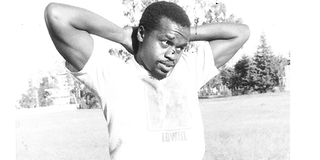Journalism don who brought Rugby to Kenyans

Mwamba's founder member Absalom “Bimbo” Mutere died in Lusaka, Zambia, on Thursday, aged 54. Photo/FILE
Absalom Mutere, “Bimbo” to his friends, was a journalist, communication scholar and media expert.
But he will especially be remembered for his huge contribution to Kenyan rugby particularly during the transformational period in the late 1970s when black players began asserting themselves in the hitherto white dominated sport.
Take a look at the list of founder members of Mwamba RFC. It reads like a who-is-who of great indigenous Kenyan rugby players of the 1970s and 80s.
Mwamba — Swahili for rock — was formed in 1978 and had Couts Otolo, lanky prop like no other, partnered by the very heavy John Gishinga.
Then there was the cool, calculating Tom Aketch, a leader who understood the game like a chess grand master, Frank Ojiambo, one of the hardest hitting flankers and Joe “Old Man” Awimbo, a favourite of all.
On the backline was centre Jimmy Owino, so suave and deadly, playing side by side with Ben Mukuria. Wycliff Mukulu, arguably the best full back this country has produced brought up the last line of defence.
Add to this list Absalom “Bimbo” Mutere, a brave, deft and deadly stand off, and you have the leading black players of that time who transformed the face of the sport.
This was a bunch of guys who strongly desired to bring rugby to the indigenous Kenyans. At that time rugby clubs in the country were managed by expatriate Europeans or white settlers. In fact, Mwamba was received with scepticism from among the local rugby aficionado.
“I am not yet entirely convinced that the birth of a new club at this particular point in time is in the best interest of our rugby,” G.B. Mills, then chairman of Kenya Rugby Football Union, told Mwamba’s inaugural 1978 official magazine.
To which Mutere, then a final year student at the University of Nairobi, who was the pioneer captain of Mwamba, responded: “It is meaningless to talk about the development of Kenyan rugby without using Kenyans as a reference point.
Passion and eloquence
Being a new club we are naturally having to face problems of acceptance; not in the formal sense but in terms of recognition by the rugby public on our interests and goals.”
His passion for rugby was not in doubt; so, too, was his eloquence with the written word, so succinctly captured in the Mwamba magazine. Mutere would go and to make a successful career in journalism and communication.
His entry into rugby was in no way a rollercoaster. “We joined Lenana High School at the same time in 1969,” said John “Speedy” Akatsa, a former Mwamba and Kenya winger.
“He was a tiny guy then and, funny enough, he never made the starting XV. During our school days the best players in that position were Walter Omaido and John Muhato. But when I met him in club rugby, he had become an outstanding flyhalf for Kenya Harlequins.”
Mutere, indeed, did not have the heavy frame of a typical rugby player, but he was a tenacious tackler. His attack repertoire was even more awesome, full of cut and slash and with an eye for scoring tries.
As for his take-no-prisoner approach on the pitch, Mutere was the opposite off it. “He was soft-spoken person whom I never saw pick a fight with anyone.
He was a peace maker,” Ojiambo, who played with Mutere at Mwamba, said. “He is the best flyhalf this country has ever produced.”
Best backline combinations
Former international Mwangi Muthee, the current chairman of Mwamba, said: “I would rate him higher than the other Kenyan great flyhalves Dave Evans, Steve Wesonga, Sammy Khakama and Ken Thimba.”
Mutere was the Kenyan stand off who directed one of the best backline combinations this country has had – of Owino, Mukuria, Akatsa, Bobby Macharia and Mukulu.
He later captained Kenya in 1985, was coach between 1990 and 1992 and chairman of selectors between 1998 and 2000.
‘Bimbo’, or ‘Bimbs’, as he was fondly called, a nickname friends say he got from his mother, was a founder member of the University of Nairobi’s Mean Machine RFC that won the 1977 Kenya Cup in their debut season.
He was to later return to the university as a scholar and teacher and help develop MA and BA programmes in its school of journalism and communication.
Mutere was educated in the UK, Uganda, Kenya and the USA. He held a BA in Political Science, MA in Journalism (Kent State University, USA), and a PhD from the University of Amsterdam.
He passed away on Thursday in Lusaka, aged just 54. He leaves behind a wife, Chalwa Mutere, and two daughters, Ayanda and Julia, from a previous marriage.
He also leaves behind a rugby fraternity that will mourn his departure while celebrating his enormous contribution to the sport.
Friends and relatives are meeting daily at Nairobi Railway Club, the home of Mwamba, for funeral arrangements.




